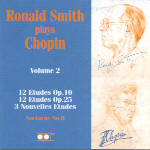Believe it or not, this is Ronald Smith’s third recording of the Chopin Etudes. His two previous editions were done for Nimbus–the first in 1980, the second six years later. I never owned the former but I held onto my copy of the latter, which is now out of print. On that recording the pianist’s sensitive sobriety held little allure on account of the murky and metallic sonics resulting from the label’s patented “Ambisonic” miking. Fortunately, on this release Bryan Crimp has taken the trouble to capture Smith’s sensitive artistry in fine (and thankfully unquirky!) sound.
At this late stage in his career, Smith is not about to enter a sprinting contest alongside the catalog’s reference versions, nor is he determined to outdazzle his younger, flashier counterparts. While some passages requiring power and sweep come off sounding labored (the climaxes in Op. 10 Nos. 3 & 4, for example), Smith’s sedate tempos often allow more room for niceities of nuance and color. He shapes the E-flat minor Etude’s middle voice as the counterline it is rather than the noodling filagree we all too often hear, and he resists plowing through the Revolutionary Etude’s taxing arpeggiated patterns for speed’s sake. I’ve rarely heard the F minor Op. 10 Etude’s rotary left-hand figurations so hyper-detailed (convincingly so, I hasten to add).
Smith’s rubato tinkerings in the A-flat Nouvelle Etude stiffen the rippling three-against-two rhythm, and Op. 10 No. 11’s spread chords don’t resonate with the full, decisive dynamism they need. But Smith proves how well the respective etudes in thirds, sixths, and octaves sound when treated as compositions rather than stunts. Within his scaled-down, intimate approach to the D-flat Nocturne Op. 27 No. 2 (the work that opens the disc), Smith lavishes attention on the melody but pulls the gently rolling left hand foundation in and out of focus. In short, Smith’s intelligent, insightful musicianship holds your attention, and his Chopin Etudes add up to an interesting supplementary version to consider after the stereo reference recordings, and are well worth hearing.
































